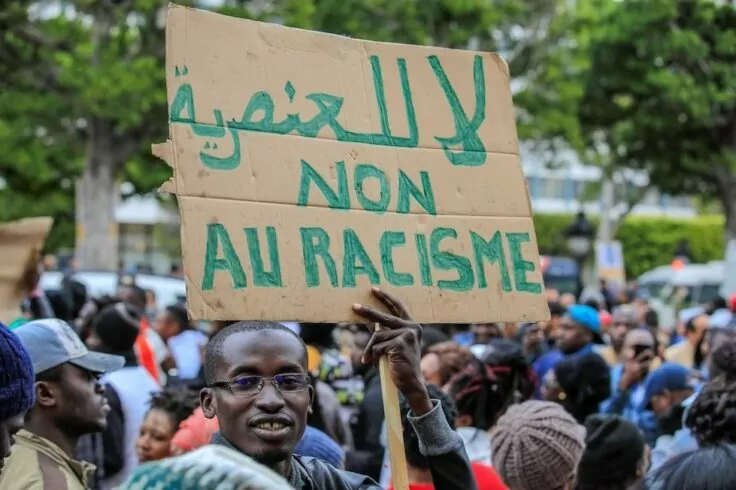Country’s black minority and sub-Saharan immigrants report regular attacks and abuse
A Tunisian woman has been given a suspended jail sentence and fined for racist insults against her daughter’s teacher, marking the first conviction under Tunisia’s new anti-racism law.
The anti-racism law was passed in October to address what rights activists say is rampant discrimination and abuse against black Tunisians and sub-Saharan migrants. The issue returned to the public spotlight recently with the murder of an Ivorian anti-racism campaigner in late December.
A court in Tunisia’s second city of Sfax heard that the mother went to the school after her daughter called to say she was being expelled for her behaviour, and insulted the teacher over the colour of his skin.
She was handed a suspended sentence of five months and a fine of 400 dinars (Dh490) – three months and 300 dinars for the racist abuse, and the rest for insulting a state employee, a court official said.
The anti-racism law prescribes punishment of up to one year in jail and a fine of 1,000 dinars for making racist insults. Incitement to hatred, making racist threats, spreading and advocating racism, and belonging to an organisation that supports discrimination are punishable by one to three years in prison and fines of up to 3,000 dinars.
Despite the law, the Tunisian anti-racism group Mnemty says it receives daily calls reporting incidents of aggression, verbal or physical, targeted against black people in the North African state. The problem affects both the minority of citizens descended from former slaves, estimated to make up between 10 and 15 per cent of the 11 million population, and about 60,000 immigrants from sub-Saharan countries.
Although Tunisia has no official statistics on racist incidents, the fatal stabbing of the Ivorian activist Falikou Coulibaly in La Soukra, north of Tunis, on December 23 was seen as an alarm signal about the scale of the problem.
Coulibaly was head of the Association of Ivorians in Tunisia (AIT) and had repeatedly spoken out about the the racism and violence experienced by Ivorian migrants in the country. Anger over his death was compounded by authorities’ claims that he was killed during an attempt to steal his phone. Police arrested several people over the murder, including a man detained the next day who reportedly confessed that he attacked Coulibaly to take his phone.
“The crime occurred in a busy street, in the public eye, with several witnesses including members of our association. It was clearly premeditated,” said Hermann Nahounou, the AIT secretary general.
“Hitting a community leader who symbolised the struggle against racism sends a strong warning message to anaesthetise the rest of the community,” said Saadia Mosbah, the president of Mnemty.
Coulibaly’s killing sparked two days of demonstrations by the sub-Saharan community in Tunisia to protest against violence towards them and the lack of response from the authorities.
“Coulibaly’s death has been a stimulus for reigniting the debate over racism among the wider community,” said Mr Nahounou, pointing to public talks organised recently on racism against blacks in Tunisia.
Besides racism, Coulibaly and the AIT also campaigned over immigration rules that leave migrants vulnerable to exploitation and abuse. More than 10,000 sub-Saharan migrants are estimated to be living in the country without documentation.
According to a study by the humanitarian groups REACH and Mercy Corps published in October, the most reported challenge for sub-Saharan migrants in Tunisia was the inability to legally stay in the country in the longer term.
Migrants who stay beyond their visa and fail to get a residency permit must pay a fine equivalent to €25 (Dh104) for each they have stayed in the country illegally. Unable to cover the penalties, many sub-Saharan Africans are forced to stay on in the country and work illegally in the informal sector. That in turn makes them vulnerable to exploitation and abuse, since they cannot go to the authorities if their employers refuse to pay them or make unfair demands, or to report racist attacks.
“It’s time to work on a draft law that protects all migrants in Tunisia. They too have the right to safety”, said Mr Mosbah.
As for the anti-racism law, Abderraouf El May, an independent MP who has campaigned for the legislation since 2016, said it was only a small step towards solving the problem. “By passing this new draft, we achieved 5 per cent. We have the remaining 95 per cent to be done. Our role now is to monitor and make sure the government executes the law.”
The real work must be accomplished through prevention and protection at the societal level, he said.
“We cannot be satisfied with the law only. As long as we witness even just one racist act in our homeland, we can’t say racism has been eradicated.”
Originally published in The National

